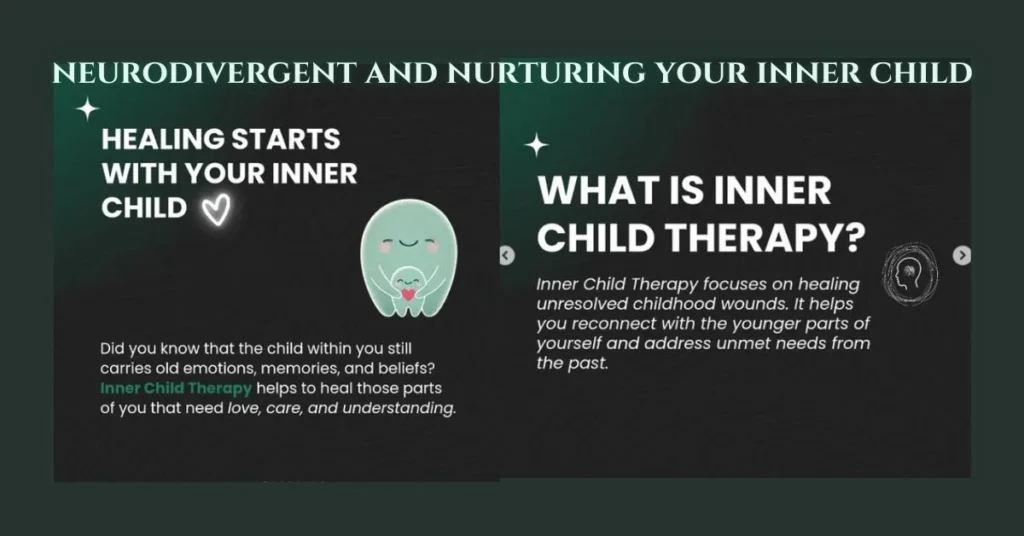Introduction to neurodivergent and nurturing your inner child
In a world that often pushes us to conform, the journey of embracing our true selves can be both liberating and challenging. For those who are neurodivergent, this path may come with unique hurdles. Yet, there lies within each of us a vibrant inner child—an essence filled with creativity, wonder, and joy. Nurturing this aspect not only fosters personal growth but also enhances mental health of neurodivergent and nurturing your inner child.
Imagine reconnecting with your playful spirit or rediscovering the simple pleasures you once cherished as a child. This blog will explore how nurturing your inner child while navigating the neurodivergent experience can lead to a healthier mindset and happier life. Whether you’re looking for practical techniques or creative outlets to express yourself, there’s a wealth of insight waiting just ahead. Let’s embark on this transformative journey together!
ALSO READ: 24685200081: Understanding Its Role and Applications
Understanding neurodivergent and nurturing your inner child
Neurodivergent individuals often experience the world differently. This can include variations in thinking, learning, and emotional processing. Embracing this diversity is essential for personal growth and mental wellness.
Nurturing your inner child involves reconnecting with the playful, creative part of yourself that may have been overshadowed by adult responsibilities or societal expectations. For those who are neurodivergent, this connection can be particularly powerful.
Understanding how your unique brain works lays a foundation for self-acceptance. It allows you to acknowledge childhood experiences that shaped who you are today.
By nurturing your inner child, you create a safe space to explore feelings and emotions without judgment. This exploration fosters healing and can lead to greater self-compassion as you navigate life’s challenges. Every step towards understanding is an opportunity for deeper connection with yourself.
The Importance of Nurturing Your Inner Child
Nurturing your inner child is vital for emotional well-being. This aspect of yourself holds the key to joy, creativity, and genuine self-expression. When you acknowledge and care for this part of you, it encourages healing from past wounds.
For neurodivergent individuals, connecting with your inner child can be especially powerful. It allows room for exploration without judgment or fear. Embracing playfulness helps reduce stress and promotes a sense of freedom.
Moreover, nurturing this inner essence builds resilience against negative thoughts. It reminds us that vulnerability is not weakness but an essential part of human experience.
Taking time to nurture your inner child fosters self-compassion and acceptance. It creates a safe space where emotions are validated rather than suppressed. By engaging with this playful side, we open doors to deeper connections with ourselves and others around us.
Common Challenges for Neurodivergent Individuals
Neurodivergent individuals often face unique challenges that can impact their daily lives. Social interactions may feel overwhelming due to the pressure of adhering to social norms and expectations. This might lead to feelings of isolation or anxiety.
Sensory sensitivities are another common hurdle. Bright lights, loud noises, or certain textures can trigger discomfort. Navigating a sensory-rich environment requires extra effort and can be exhausting.
Executive functioning issues also pose difficulties for many neurodivergent people. Tasks like organizing, planning, or managing time can become daunting obstacles rather than straightforward activities.
Additionally, societal misunderstanding often leaves neurodivergent individuals feeling invalidated or marginalized. Lack of awareness about their experiences contributes to barriers in education and employment settings.
These challenges highlight the importance of self-compassion and understanding one’s needs while nurturing personal growth strategies tailored specifically for each individual’s journey.
Techniques for Nurturing Your Inner Child
Nurturing your inner child can be a transformative experience, especially for neurodivergent individuals. One effective technique is engaging in play. Find activities that spark joy, whether it’s painting, playing games, or building with blocks.
Another powerful method is journaling. Write letters to your inner child expressing love and understanding. This fosters a connection that may have been lost over time.
Mindfulness exercises also work wonders. Spend quiet moments reflecting on feelings from childhood. Acknowledge them without judgment; this creates space for healing.
Incorporate nature into your routine too. Simple walks or picnics can evoke childlike wonder and refresh the spirit.
Create rituals that celebrate you as a person—whether it’s pampering yourself with self-care days or indulging in favorite childhood snacks, these small acts can nurture your inner essence profoundly.
Using Creativity to Connect with Your Inner Child
Creativity can be a powerful bridge to your inner child. Engaging in artistic activities invites you to explore emotions and experiences without judgment. Whether it’s painting, writing, or dancing, these outlets allow for self-expression that resonates with the playful spirit of childhood.
Consider picking up crayons or markers and letting your imagination run wild. Create scenes that reflect how you feel or what you dream about. There’s no right or wrong here; just let the colors flow.
Journaling can also awaken your inner child’s voice. Write letters to yourself from this younger perspective—share hopes, fears, and joys. This practice fosters connection and understanding.
Don’t forget movement! Dance like nobody’s watching or engage in spontaneous play outdoors. These simple acts remind us of the freedom we once felt as children, forging a deeper link to our authentic selves through creativity.
Seeking Support and Resources for Mental Health
Finding support is crucial for anyone on a mental health journey, especially for those who are neurodivergent. Connecting with like-minded individuals can be incredibly uplifting.
Look for local or online communities that focus on neurodiversity. These spaces often provide safe environments to share experiences and insights. Engaging in discussions can help reduce feelings of isolation.
Professional resources also play a vital role. Therapists trained in neurodiversity understand unique challenges better than traditional approaches might allow. They can offer tailored strategies that resonate with your specific needs.
Don’t overlook self-help resources either—books, podcasts, and workshops abound. These tools can empower you by providing new perspectives and coping techniques.
Remember, seeking help is not a sign of weakness but an important step toward nurturing your inner child and overall well-being. Finding the right support makes all the difference in this journey.
Conclusion: Embracing Your Neurodiversity and Inner Child for a Happier, Healthier Life
Embracing your neurodiversity and nurturing your inner child can lead to a more fulfilling life. Recognizing the unique ways in which you experience the world is a powerful first step toward self-acceptance. It’s essential to honor both aspects of yourself—the complexities of being neurodivergent and the joyful, innocent spirit of your inner child.
Taking time for this nurturing journey not only enhances mental health but also fosters resilience. The techniques discussed, from creative expression to seeking support, create pathways for healing and growth. If you’re feeling overwhelmed or unsure where to begin, remember that small steps can lead to significant changes.
Every effort counts when it comes to fostering understanding within yourself. Whether through art, playfulness, or sharing experiences with others who understand your journey, every moment dedicated to connecting with your inner child matters.
As you continue on this path, allow yourself grace and patience. Celebrate the quirks that make you uniquely you while embracing joy in rediscovering childhood wonderment. This balance between honoring who you are now and reconnecting with who you were as a child will pave the way for deeper satisfaction in life—leading ultimately towards happiness and healthiness.
ALSO READ: Pi123: Essential Guide to Crypto Insights and Reviews
FAQs
What is “neurodivergent and nurturing your inner child”?
It refers to reconnecting with the playful, creative part of yourself while embracing neurodivergence, enhancing mental well-being and self-compassion.
How can nurturing your inner child improve mental health?
Nurturing your inner child promotes healing, reduces stress, and fosters creativity, leading to a more resilient and joyful mindset.
What challenges do neurodivergent individuals face when reconnecting with their inner child?
Neurodivergent individuals may experience challenges like social anxiety, sensory sensitivities, and executive functioning issues, which can impact their journey to self-acceptance.
What are some practical techniques to nurture your inner child?
Engage in play, practice mindfulness, journal, explore creativity through art, and connect with nature to reconnect with your inner child.
Why is it important to seek support when nurturing your inner child as a neurodivergent individual?
Support from like-minded communities and therapists who understand neurodiversity can provide tailored strategies and reduce feelings of isolation, aiding emotional growth.







